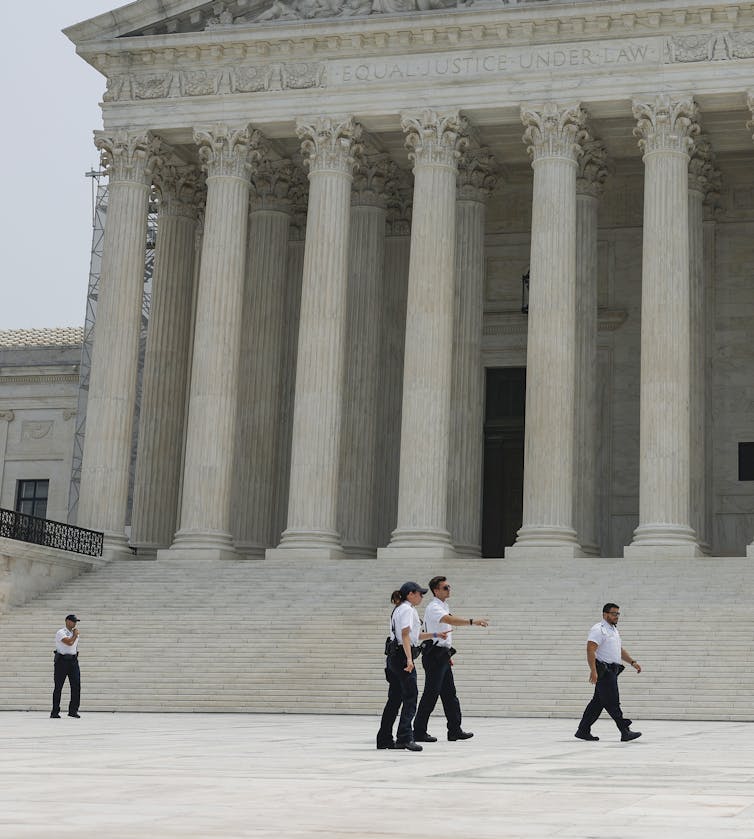
Experts in autocracies have pointed out that it is, unfortunately, easy to slip into normalizing the tyrant, hence it is important to hang on to outrage. These incidents which seem to call for the efforts of the Greek Furies (Erinyes) to come and deal with them will, I hope, help with that. As a reminder, though no one really knows how many there were supposed to be, the three names we have are Alecto, Megaera, and Tisiphone. These roughly translate as “unceasing,” “grudging,” and “vengeful destruction.”
In the last couple of months, I think we were all shocked that the state of Alabama chose to defy the Supreme Court of the United States by redrawing the map of its Congressional Districts to be more, not less, racist. But just because we haven’t noticed it before doesn’t mean it hasn’t been done. Each of the parts of this article refers us to a longer article, more dedicated to the events of that particular case and its repercussions. But you can certainly get an idea from the summaries. The third one in particular is noteworthy because it is predictive of where we may be going in the future – especially if we continue to lose bits and pieces of our democracy.
==============================================================
Alabama is not the first state to defy a Supreme Court ruling: 3 essential reads on why that matters

Anna Moneymaker/Getty Images
Howard Manly, The Conversation
In its 5-4 Allen v. Milligan decision on June 8, 2023, the U.S. Supreme Court ordered the state of Alabama to redraw its congressional voting districts and consider race as it made up the new districts. The court had found that the state’s political districts diluted the strength of Black voters by denying them the possibility of electing a second Black member to the state’s congressional delegation.
While the court did not specifically order the state to create a second majority-Black congressional district, Chief Justice John Roberts made it clear how he viewed the long history of racist voter suppression in Alabama – and what factors should weigh prominently in the state’s new political map.
“States shouldn’t let race be the primary factor in deciding how to draw boundaries, but it should be a consideration,” Roberts wrote. “The line we have drawn is between consciousness and predominance.”
Alabama state officials submitted the state’s new boundaries by the Republican-controlled state legislature in late July.
But the new districts still include only one in which Black voters could reasonably elect a candidate of their own choosing, not two as voting rights advocates had argued – and as the Supreme Court appeared to endorse.
Over the years, The Conversation U.S. has published numerous stories exploring the consequences of not complying with court rulings and what resistance, including resistance to decisions involving race, does to the legitimacy of America’s legal system. Here are selections from those articles.
1. When the Supreme court loses Americans’ loyalty
As political scientists Joseph Daniel Ura of Texas A&M and Matthew Hall of Notre Dame wrote, the Supreme Court’s 1954 decision in Brown v. Board of Education revealed “white Americans’ tenuous loyalty” to the authority of the federal judiciary.
In Brown, the court unanimously held that racial segregation in public education violates the equal protection clause of the 14th Amendment.
“Rather than recognizing the court’s authoritative interpretation of the Constitution,” Ura and Hall explained, “many white Americans participated in an extended, violent campaign of resistance to the desegregation ruling.”
The result of such resistance is clear. “Eroding legitimacy means that government officials and ordinary people become increasingly unlikely to accept public policies with which they disagree,” they wrote.
2. Oklahoma resists ruling over tribal authority
In June 2020, the Supreme Court decided in McGirt v. Oklahoma that the Muscogee Creek reservation in Oklahoma is Indian Country.
As an expert in federal Indian law at Wayne State University, Kirsten Matoy Carlson wrote that the ruling meant federal criminal laws applied to much of eastern Oklahoma as Indian Country and enabled the federal government – instead of the state of Oklahoma – to prosecute crimes committed by and against American Indians there.
Oklahoma state officials refused to comply and actively resisted implementation of the McGirt decision. They asked the Supreme Court to reverse it over 40 times.
The strategy paid off. The U.S. Supreme Court took up a similar case and in June 2022, decided to roll back some of its 2020 decision.
As Carlson wrote, “Conflicts between state and tribal governments are not new; states have long tried to assert power – often violently – over sovereign tribes.”
3. Court’s power may pose a danger to its legitimacy
Political scientist Richard L. Pacelle Jr. at University of Tennessee, Knoxville has examined how the power and authority of the court have waxed and waned over the centuries.
“That immense power has arguably made the court a leading player in enacting policy in the U.S,” Pacelle wrote. “It may also cause the loss of the court’s legitimacy, which can be defined as popular acceptance of a government, political regime or system of governance.”
Editor’s note: This story is a roundup of articles from The Conversation’s archives.![]()
Howard Manly, Race + Equity Editor, The Conversation
This article is republished from The Conversation under a Creative Commons license. Read the original article.
==============================================================
Alecto, Megaera, and Tisiphone, it’s noteworthy that all the resistance seems to come from people – and parties – who profess their dedication to “law and order” – yet when it comes to actually administering law by applying the strongest legal decisions, suddenly they disappear. Or at least their commitment to “law and order” does. Eventually we who actually do believe in law and order, as well as facts, reason, and logic, are going to have to address this dissonance. Ignoring it is obviously not working.
The Furies and I will be back.

Sorry, the comment form is closed at this time.